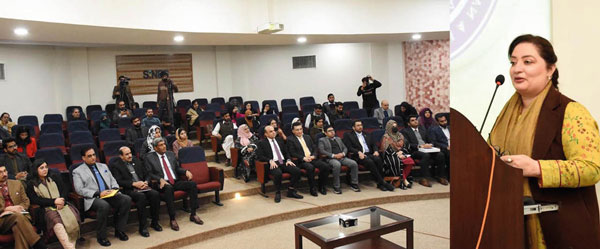PM’s Coordinator on Climate Change & Environmental Coordination (MoCC), Romina Khurshid Alam emphasized the urgent need for robust climate action and implement the roadmap agreed at the historic Baku event
She was addressing a seminar on “COP 29 commitments to COP 30 action: A critical analysis,” held at the National University of Sciences and Technology (NUST) on Friday.
Her remarks followed the findings of the global stock take and the intergovernmental panel on climate change’s sixth assessment report, which highlighted that the world has failed to meet the Paris Agreement goal of limiting global temperature rise to 1.5°C.
Ms. Romina underscored Pakistan’s significant contributions at COP29, particularly in technical negotiations and bilateral engagements, positioning the country as a leader in global climate discussions.
She also addressed the importance of trusted and transparent cross-border carbon markets, which can reduce the cost of implementing nationally determined contributions by up to $250 billion annually, helping Pakistan enhance its climate action efforts.
The panelists from MoCC, Additional Secretary Zulfiqar Younas and Carbon Market Specialist Ms. Sana Rasool, along with Dr. Faisal Abbas, Dr. Majid Ali, and Dr. Salman Atif from NUST, made valuable contributions on carbon credit and the role of academia in efforts to mitigate climate impacts.
In her remarks on financial opportunities, Ms. Romina highlighted the $300 billion annual core commitment under the Baku finance goal, along with projected $1 trillion in carbon market flows by 2050. These financial resources, she explained, could provide substantial relief for Pakistan in implementing climate plans, particularly in the areas of mitigation and adaptation. “Pakistan must strategically position itself to access these financial flows to support its climate projects,” she stressed.
Ms. Romina also discussed the potential for over $730 million pledged for projects starting in 2025, which could be leveraged to address the damages caused by climate-induced disasters, including the losses from the devastating 2022 floods. On gender-responsive climate action, Ms. Romina pointed out the extension of the Lima work programme on gender, which presents an opportunity to empower grassroots women’s organizations and indigenous women in climate adaptation and mitigation efforts.
Furthermore, she emphasized the importance of improving data management and reporting systems to meet international requirements, ensuring Pakistan benefits from capacity-building initiatives and strengthens its climate governance through enhanced transparency frameworks.
Ms. Romina said we like to retain and build upon the momentum of its leadership in climate negotiations created at COP29. She noted that with the support of evidence-based insights and academic partners like NUST, Pakistan could position itself as a key player in global climate governance. “Academia can play a vital role in ensuring that Pakistan remains competitive in the emerging global climate finance and carbon markets,” she added.
Ms. Romina also highlighted the Genentech Hub, a groundbreaking initiative designed to drive cutting-edge technological solutions, enabling Pakistan’s industries to meet international climate benchmarks. “A strategic focus on these opportunities will align Pakistan’s climate goals with its broader sustainable development priorities,” she stated.








